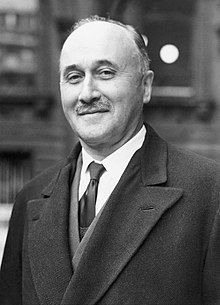User:Delvinë Racaj/sandbox
| (in French) Fondation Jean Monnet pour l'Europe | |
 The foundation is based on the campus of the University of Lausanne. | |
| Formation | 1978[1] |
|---|---|
| Founder | Jean Monnet[1] |
| Location |
|
Official language | French and English |
| Website | jean-monnet.ch |
The Jean Monnet Foundation for Europe is a public-utility and independent institution[2], created in 1978 by Jean Monnet and Henri Rieben, and dedicated to the conservation of Monnet's archives. Based in Lausanne since its creation, the foundation is located since 1981 at the Ferme de Dorigny, on the campus of the University of Lausanne. The foundation's activities range from the organization of events (conferences, dialogues, academic seminars and Gold Medal Award ceremonies) to the conservation and the enhancement of its collection of archives and documents.[3]
History
[edit]The origins of the foundation can be traced back to the encounter between Jean Monnet and Henri Rieben in 1955. From that time, several associations were created at the initiative of the two men. Reasons for the creation of these organizations are found when considering the devotion to and the great interest that Rieben had in Monnet, as well as the easiness to create [[Swiss association|associations in Switzerland.

The first of these initiatives was the Association de gestion administrative du Comité d'action pour les États-Unis d'Europe, which had for mission the administrative management of the Action Committee for the United States of Europe. Registered in 1955 in Lausanne, Henri Rieben becomes its administrative secretary and Monnet its president. The facilities of the Comité d'action, however, were located in Paris, at the Avenue Foch, until its dissolution in 1975.
In 1957, Jean Monnet and Henri Rieben created another association in Lausanne, the Centre de recherches européennes, dedicated to creating a documentation center for European Studies. Under the command of Henri Rieben, the Center published numerous academic works as part of the « Cahiers rouges » collection.
The third association was created in 1963 in Lausanne with the signatures of Jean Monnet as president and Henri Rieben as administrative secretary. Under the name of "Institut de recherches historiques européennes" (translated as "Institute for European Historical Research"), its aim was to gather archives and produce knowledge about the history of European integration. It was also located at the Avenue Foch, in Paris. Its first editorial project was the publication of the Memoirs of Jean Monnet.[4][5]
In 1978, Jean Monnet entrusted the Institute with all of his archives. The transfer from Paris to Lausanne was carried out during the same year, six months before Monnet's death. The Institute was dissolved in 1983, as the Centre de recherches européennes was created. In the same year, Jean Monnet and Rieben created a new association, under the name of Fondation Jean Monnet pour l'Europe. Its goals were to preserve the Jean Monnet archives and, "inspired by the thinking, methods and actions of Jean Monnet", to support initiatives dedicated to the establishment of European unity.[6][3]
Archives
[edit]The foundation houses the personal archives of Jean Monnet, Robert Schuman, Robert Marjolin, François Fontaine, Jacques Van Helmont, Paolo Emilio Taviani, Robert Triffin, and the Earl of Perth, and of other figures from European institutions.
Gold Medals of the Foundation
[edit]The Gold Medal of the Jean Monnet Foundation for Europe (Médaille d'or de la Fondation Jean Monnet pour l'Europe) was awarded to:
- 1996: Juan Carlos, King of Spain
- 2000: Carlo Azeglio Ciampi, President of Italy
- 2002: Ferenc Mádl, President of the Republic of Hungary
- 2007: Helmut Kohl, former Chancellor of Germany
- 2008: Jean-Claude Juncker, former Prime Ministers of Luxembourg
- 2011:
- 2014:
Presidents of the Foundation
[edit]- 1978-2005: Henri Rieben[6]
- 2006-2008: Bronislaw Geremek
- 2009-2014: José Maria Gil-Robles
- Since 2015: Pat Cox
Publications
[edit]The Jean Monnet Foundation for Europe has been publishing works as part of two different collections:
- The "Cahiers rouges" collection[7], created in 1957. Under the command of Henri Rieben, it will present historical sources, monographs and conference proceedings about subjects ranging from Monnet's life to international relations between Switzerland and Europe. The collection aims to nourish debates about both the history and the current course of European integration, as well as establishing a collective memory of European construction by collecting and publishing testimonies of protagonists.
- "Debates and Documents" collection[8], launched in 2014. The series aims to contribute to current debates about European issues and to enhance the archival collection of the foundation. It publishes about two issues per year.
Notes and references
[edit]- ^ a b Overview and statutes of the Jean Monnet Foundation for Europe (oage visited on 28 January 2015).
- ^ "Bundesunterstützung Fondation Jean Monnet pour l'Europe - Texts". www.aramis.admin.ch. Retrieved 25 January 2022.
{{cite web}}: CS1 maint: url-status (link) - ^ a b "Fondation Jean Monnet pour l'Europe : statuts" (PDF) (in French). Archived (PDF) from the original on 24 January 2022. Retrieved 24 January 2022.
- ^ Pandazis, Delphine (2018). Jean Monnet et ses Mémoires : les coulisses d'une longue entreprise collective (1952-1976) (in French). Lausanne, Suisse. pp. 65–108. ISBN 978-2-88901-145-2. OCLC 1079433839.
{{cite book}}: CS1 maint: location missing publisher (link) - ^ Hackett, Clifford P. (2016). Who Wrote the Memoirs of Jean Monnet? : an Intimate Account of an Historic Collaboration. New York. ISBN 978-1-4331-3424-1. OCLC 954424013.
{{cite book}}: CS1 maint: location missing publisher (link) - ^ a b Olivier Perrin, "Jean Monnet, l'Européen dont l'héritage vit à Lausanne", Le Temps, Wednesday 13 July 2016 (page visited on 13 July 2016).
- ^ "Red Books : list of publications". Fondation Jean Monnet pour l'Europe. Retrieved 7 February 2022.
{{cite web}}: CS1 maint: url-status (link) - ^ "Debates and Documents Collection : Full list of publications". Jean-Monnet. Retrieved 7 February 2022.
{{cite web}}: CS1 maint: url-status (link)
See also
[edit]- Jean Monnet (1888-1979)
- History of the European Union
- Lausanne campus

